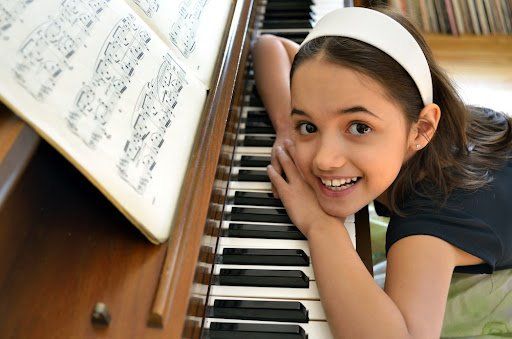
Choosing a Musical Instrument – Which Is Best for My Child?
Introducing your child to the world of music is a journey filled with excitement and possibilities. However, when it comes to choosing the right musical instrument for your child, it can be a challenging decision. As parents, you may wonder where to begin and how to help your child make the best choice. No parent wants to set their child up for failure, but all musical instruments take dedication and a positive attitude, “sticktoitiveness,” as we like to call it!
In this article, we will explore some helpful suggestions for guiding your child in choosing a musical instrument that resonates with their interests and abilities and sets them up for the best chance of enjoyment and success.
Choosing a Musical Instrument – Start with the Basics: Piano
Toddlers and babies don’t have the dexterity/focus for learning an instrument, but they can start getting a feel for, and understanding, rhythm, and dance (see our JamBABY classes); for the youngest learners eager to start engaging with a musical instrument starting with the piano is an excellent choice.
The piano provides a strong foundation in music theory, rhythm, and hand-eye coordination. Its visual layout makes it accessible to young children. If you’re curious about what age to start piano lessons, they can begin as early as age four or five, and many music schools and classes offer specialized programs for preschoolers. Early exposure to the piano can be a stepping stone to exploring other instruments later on.
Choosing a Musical Instrument – Observe Your Child’s Interests
Take note of your child’s interests and inclinations regarding music. Observe how they react to different instruments and musical genres. Do they tap their feet to a drum beat or hum along to a sweet melody/tune? Understanding their natural inclinations can help narrow down their choices, even if they don’t take notice of their habits.
Consider Age and Physical Development
Your child’s age and physical development are essential factors to consider when selecting an instrument. Certain instruments, such as the violin or trumpet, may require more strength and coordination than others. For younger children, instruments like the recorder, xylophone, or ukulele are excellent options as they are easy to handle and produce pleasing sounds with minimal effort. We often get inquiries about the age range to start guitar lessons for kids, which we recommend between the ages of 5-10, depending on dexterity and experience with other instruments.
Ultimately, let your child’s preferences and passion guide their decision-making process. Some children may feel drawn to the soft melodies of a violin, while others may find joy in the rhythm of a drum. By following their interests, your child will be more motivated and engaged in learning to play the instrument, and it will seem less like a homework assignment.
When to Learn More Than One Instrument?
Children may sometimes express an interest in learning more than one instrument. While this can benefit their musical development, striking a balance is essential. Learning multiple instruments simultaneously can be overwhelming and may hinder their progress in mastering each one. If your child expresses a strong interest in more than one instrument, consider focusing on one instrument initially and gradually introducing others as they gain proficiency.
Choosing a Musical Instrument – Get Some Professional Guidance
If your child is struggling to decide, seek the guidance of experienced music educators/teachers. They can assess your child’s musical aptitude and recommend instruments that align with their abilities and interests. Music classes will have knowledgeable instructors who can provide valuable insights.
Choosing a musical instrument for your child is a process that requires patience, observation, and exploration. Pay attention to your child’s interests and inclinations, and provide opportunities for hands-on experiences with various instruments. Let their passion guide them, and consider seeking professional guidance when needed.
Remember, the key is to nurture their love for music and create a positive and enjoyable musical journey for them! First and foremost, music needs to be fun; if it isn’t, the passion will never take hold.
To learn more about children’s music lessons and different ways to expose your child to music, please contact us today.